We have selected speakers who have excellent ability and experience to present some of the conflicts between the needs of wildlife, tourists,, operators and residents and able to point the way to resolving some of these problems. Our roundtable workshop sessions will allow time for plenty of discussion on all of these issues, plus of course plenty of networking time to engage in conversation with our speakers in an informal way.
Anne Hardy
 Dr Hardy will be opening the conference on Monday
Dr Hardy will be opening the conference on Monday
Dr. Anne Hardy is the Co-Director of the Tourism Research and Education Network (TRENd) at the University of Tasmania. She grew up in Tasmania, Australia, before moving to Queensland, where she undertook her Phd at the University of Queensland. Along with the University of Tasmania and Queensland, Anne worked at University of Northern British Columbia in Canada from 2004, before returning to Tasmania in 2007. She is currently undertaking research in three areas: the neo-tribal behaviour of tourists; sustainable tourism; and tracking tourists’ movement. Her work has been published in national and international journals and books and is highly cited. Anne is the lead investigator on the Tourism Tracer project that has received international acclaim and won numerous awards; it is the first research project to track tourists across an entire destination for the duration of their stay. Tourism Tracer has been made an official ‘research partner’ of the United Nations World Tourism Organisation’s Sustainable Tourism branch and was recently commercialised. Along with her academic activities, Anne is a member of the Tasmanian Destination South Board and makes regular appearances in print, radio and television regarding tourism matters.
Nicolas de Graaf
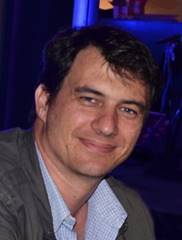 Nicolas de Graaff has worked in the zoo industry for over 20 years, caring for a variety of animals such as Great Apes, Leaf Monkeys, Big Cats, and Rhinoceros, as well as fulfilling roles in collection management, exhibit planning and legislative compliance. Since 2013 Nick has operated in the role of Accreditation Manager for the Zoo Aquarium Association (ZAA) Australasia. Nick works closely with the ZAA Standards and Accreditation Committee to facilitate the development and implementation the ZAA’s Accreditation Program, primarily focused on ‘positive’ animal welfare. Nick also undertakes site assessments with ZAA Members in accordance with the Accreditation Program. Nick holds a Bachelor of Science (Biology) and is an Associate of the Massey University Animal Welfare Science and Bioethics Centre.
Nicolas de Graaff has worked in the zoo industry for over 20 years, caring for a variety of animals such as Great Apes, Leaf Monkeys, Big Cats, and Rhinoceros, as well as fulfilling roles in collection management, exhibit planning and legislative compliance. Since 2013 Nick has operated in the role of Accreditation Manager for the Zoo Aquarium Association (ZAA) Australasia. Nick works closely with the ZAA Standards and Accreditation Committee to facilitate the development and implementation the ZAA’s Accreditation Program, primarily focused on ‘positive’ animal welfare. Nick also undertakes site assessments with ZAA Members in accordance with the Accreditation Program. Nick holds a Bachelor of Science (Biology) and is an Associate of the Massey University Animal Welfare Science and Bioethics Centre.
Lizzie Corke
From the website https://www.conservationecologycentre.org:
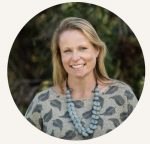 Together with Shayne Neal, Lizzie established the Conservation Ecology Centre in order to develop and deliver solutions to the most urgent conservation challenges in the Otways. With a background in natural sciences (BSc Zool, The University of Melbourne, 2001) she works to facilitate this important work by supporting a team committed to effective conservation and organisational development, building partnerships, and engaging our community. This work was recognised by the Australian Geographic Society Conservation Award in 2007.
Together with Shayne Neal, Lizzie established the Conservation Ecology Centre in order to develop and deliver solutions to the most urgent conservation challenges in the Otways. With a background in natural sciences (BSc Zool, The University of Melbourne, 2001) she works to facilitate this important work by supporting a team committed to effective conservation and organisational development, building partnerships, and engaging our community. This work was recognised by the Australian Geographic Society Conservation Award in 2007.
Ecotourism plays a critical role in the CEC’s funding and engagement programs – the Centre established the Great Ocean Ecolodge in 2004 (Winner Victorian Tourism Awards for best new development, recognised by National Geographic Traveller as one of the 25 best ecolodges in the world). Lizzie is currently also working the development of a new social enterprise ecotourism venture ‘Wildlife Wonders’ on the Great Ocean Road. Designed by the Greens Master of the Lord of the Rings and Art Director of The Hobbit films, ‘Wildlife Wonders’ will provide outstanding opportunities for conservation and sustainable economic development in the region.
Lizzie is a Director of Ecotourism Australia, Chair of the Corangamite Catchment Management Authority Community Advisory Group and the recipient of the 2005 Prime Minister’s Award for Environmentalist of the Year.
See an interview with Lizzie here
Joy Tripovich
 Opinions and emotions are often more in evidence than actual facts when discussing the needs of wildlife, so it is always good to see actual research into effects on their welfare, behaviour and conservation ecology. Dr Joy Tripovich is a biologist from the University of New South Wales. Her research aims to understand the role of acoustic communication in the behaviour, ecology and spatial movements of animals. It also aims to unravel how acoustic signals produced by animals can adapt and change under varying environmental and anthropogenic fluctuations. The abstract of one of Joy’s research papers (The Behavioural Response of Australian Fur Seals to Motor Boat Noise) includes the following:
Opinions and emotions are often more in evidence than actual facts when discussing the needs of wildlife, so it is always good to see actual research into effects on their welfare, behaviour and conservation ecology. Dr Joy Tripovich is a biologist from the University of New South Wales. Her research aims to understand the role of acoustic communication in the behaviour, ecology and spatial movements of animals. It also aims to unravel how acoustic signals produced by animals can adapt and change under varying environmental and anthropogenic fluctuations. The abstract of one of Joy’s research papers (The Behavioural Response of Australian Fur Seals to Motor Boat Noise) includes the following:
Our results show there were significant differences in the seals’ behaviour at low (64–70 dB) versus high (75–85 dB) sound levels, with seals orientating themselves towards or physically moving away from the louder boat noise at three different sound levels. Furthermore, seals responded more aggressively with one another and were more alert when they heard louder boat noise. Australian fur seals demonstrated plasticity in their vocal responses to boat noise with calls being significantly different between the various sound intensities and barks tending to get faster as the boat noise got louder. These results suggest that Australian fur seals on Kanowna Island show behavioural disturbance to high level boat noise. Consequently, it is recommended that an appropriate level of received boat sound emissions at breeding fur seal colonies be below 74 dB and that these findings be taken into account when evaluating appropriate approach distances and speed limits for boats.
Joy is also looking at the effects of chronic infrasound on dog welfare: research that could well have implications for wildlife as well, both in captive settings or near major tourism activity.
Ian Morris
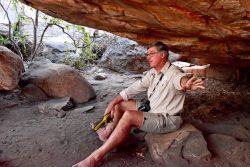 Long experience and a genuine empathy for both animals and people can also provide valuable insights into the the balancing acts necessary to cater to the needs of both when interacting. From Ian:
Long experience and a genuine empathy for both animals and people can also provide valuable insights into the the balancing acts necessary to cater to the needs of both when interacting. From Ian:
My whole life has been spent on the ‘front line’ where people & nature meet. Usually at the confrontation point, wildlife is the loser, but I am convinced that if the background circumstances are right, both humans & wildlife can benefit. Had we been more sensitive to these issues from the point of European colonisation of this country, Australia would be a very much better place today.
In my opinion, those ‘background circumstances’ are issues for individuals like education in the broad sense, awareness, sensitivity & commitment. Humans relating in a positive sense to wildlife is almost a science.I spent many of my formative years with Arnhem Land Aboriginal people, who had quite a different perspective on the relationships between people & wildlife to non-indigenous, which has subsequently helped me to broaden my perspective on this critical subject. I would be happy to share this perspective at your conference, as part of a bigger picture. I am not so concerned with the negative aspects of close human interaction with native species, as I think they are mainly common sense issues. The impacts of land clearing, roads, feral animals, overgrazing, poor driving skills, etc. are all serious issues which will improve as people gain a better appreciation of the value of our native fauna & flora in my opinion. Environmental education needs a much higher profile in this country in my opinion.Getting back to my philosophy, I believe that all Aussie animals have the innate ability to relate to people (if the circumstances are favourable) & I’d be happy to share some interesting examples with the conference delegates. It is generally ignorance & fear that prevent people from understanding such relationships, particularly with species higher on the food chain than us. I think that tourism has an important role to play in this process by introducing people to wildlife from an ecological perspective & breaking down inaccurate perceptions of our various native species. Above all, it is exciting & stimulating for people to discover these qualities for themselves. I enjoy being involved in eco-tourism for that reason & I see people change their opinions constantly.
Dr Rosie Booth
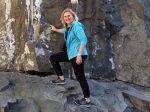 Rosie grew up in Toowoomba and studied Veterinary Science at the University of Queensland. After 5 years in mixed practice, a chance encounter with a koala led Rosie to undertake a Masters degree studying koala adrenal function and stress. Her first zoo position was at Lone Pine Koala Sanctuary with a captive population of 80 koalas. This was followed by six years with the Zoological Board of Victoria which allowed Rosie the opportunity to participate in a number of captive breeding programs for threatened species and develop a passion for platypuses. In 1995, Rosie represented the Australian Association of Veterinary Conservation Biologists and AusAID providing training to Nepalese Veterinarians on wildlife management. From 2004 to 2011 Rosie worked as the co-ordinator of captive breeding of threatened species for the Queensland State Government. During this time, she managed the captive breeding and re-introduction of 172 individuals of 6 species. Rosie has continued her commitment to conservation, research and wildlife rehabilitation by taking up the position of Director of the Australia Zoo Wildlife Hospital. The hospital has treated more than 75,000 wild animals since opening in 2004 and contributes to research with direct conservation outcomes and promotes a harmonious co-existence between humans and the wild animals which share our planet.
Rosie grew up in Toowoomba and studied Veterinary Science at the University of Queensland. After 5 years in mixed practice, a chance encounter with a koala led Rosie to undertake a Masters degree studying koala adrenal function and stress. Her first zoo position was at Lone Pine Koala Sanctuary with a captive population of 80 koalas. This was followed by six years with the Zoological Board of Victoria which allowed Rosie the opportunity to participate in a number of captive breeding programs for threatened species and develop a passion for platypuses. In 1995, Rosie represented the Australian Association of Veterinary Conservation Biologists and AusAID providing training to Nepalese Veterinarians on wildlife management. From 2004 to 2011 Rosie worked as the co-ordinator of captive breeding of threatened species for the Queensland State Government. During this time, she managed the captive breeding and re-introduction of 172 individuals of 6 species. Rosie has continued her commitment to conservation, research and wildlife rehabilitation by taking up the position of Director of the Australia Zoo Wildlife Hospital. The hospital has treated more than 75,000 wild animals since opening in 2004 and contributes to research with direct conservation outcomes and promotes a harmonious co-existence between humans and the wild animals which share our planet.
Unfortunately we were unable to raise the funding to bring Paul to Australia
Paul Sadera Kilelu
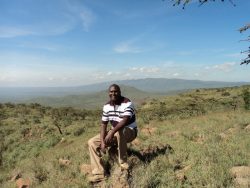 We hear a lot about conservation work done by people originally from Europe, America or elsewhere, not enough about the struggles and achievements of those born in the African countries, part of the local population, who care deeply about wildlife conservation and also very aware of the problems of local people who may be affected by wildlife and the benefits and impacts of increasing tourism. Paul is raising some of the finance he needs to reach our conference, and WTA is also assisting, but additional sponsorship would be much appreciated. He is also very interested in conversing before and after the conference with people involved in resolving wildlife/agriculture conflicts here is Australia.
We hear a lot about conservation work done by people originally from Europe, America or elsewhere, not enough about the struggles and achievements of those born in the African countries, part of the local population, who care deeply about wildlife conservation and also very aware of the problems of local people who may be affected by wildlife and the benefits and impacts of increasing tourism. Paul is raising some of the finance he needs to reach our conference, and WTA is also assisting, but additional sponsorship would be much appreciated. He is also very interested in conversing before and after the conference with people involved in resolving wildlife/agriculture conflicts here is Australia.
We hope to welcome here for a future event
Please visit https://www.youtube.com/watch?v=sDmYsSzW76E to see a little of what Enkusero Sampu Conservancy’s work is about.
